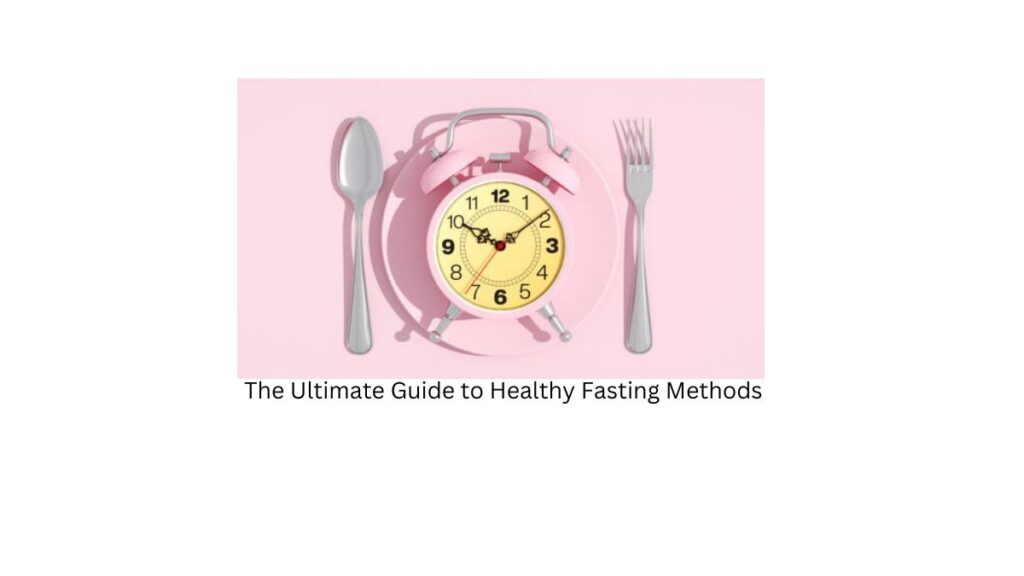Introduction:
“Unlocking Optimal Health: The Ultimate Guide to Healthy Fasting Methods”

In a world focused on wellness, healthy fasting has emerged as a powerful strategy for optimizing health. This comprehensive guide will walk you through the ultimate methods of healthy fasting, providing valuable insights and practical tips to help you embark on a journey toward a rejuvenated and balanced life.
1.Understanding Healthy Fasting Methods:
Healthy fasting involves conscious and strategic periods of abstaining from food, promoting various health benefits. Delve into the science behind fasting and its positive impact on metabolism, cellular repair, and overall well-being.
- Types of Healthy Fasting: Explore the diverse approaches to healthy fasting, from intermittent fasting patterns to more extended water fasts. Understand the benefits and considerations associated with each method, empowering you to choose the approach that aligns with your lifestyle and health goals.
- Building a Balanced Fasting Routine: Learn how to design a fasting routine that suits your individual needs. Discover the importance of balanced nutrition during eating windows and explore ways to maintain energy levels and nutritional intake while fasting.
- Tips for a Successful Fasting Experience: Uncover practical tips for a smooth and effective fasting journey. From staying hydrated to incorporating nutrient-rich foods, these insights will enhance your overall fasting experience and contribute to sustained well-being.
- Navigating Challenges and Common Concerns: Address common concerns and challenges associated with fasting, such as potential side effects and overcoming mental barriers. Equip yourself with strategies to navigate these hurdles and make your fasting journey a positive and rewarding experience.
- Integrating Fasting into a Healthy Lifestyle: Fasting is just one component of a holistic approach to health. Learn how to integrate fasting seamlessly into your lifestyle, combining it with regular exercise, adequate sleep, and stress management for a well-rounded approach to wellness.
- Consulting with Healthcare Professionals: Prioritize your health by consulting with healthcare professionals before starting any fasting regimen, especially if you have pre-existing health conditions. This guide emphasizes the importance of personalized advice to ensure a safe and effective fasting experience.
- Tracking Progress and Adjusting: Explore methods for tracking your progress and making necessary adjustments to your fasting routine. Whether through journaling, apps, or other tools, monitoring your journey allows for continual optimization and a better understanding of your body’s response.
Which type of fasting burns the most fat?
The effectiveness of different fasting methods in burning fat can vary from person to person, and factors such as individual metabolism, lifestyle, and overall health play significant roles. However, some fasting methods are commonly associated with fat burning. Here are a few:

- Intermittent Fasting (IF):
- 16/8 Method: Involves fasting for 16 hours and eating within an 8-hour window each day. This method is known to help with fat loss by promoting a calorie deficit during the fasting period.
- Alternate-Day Fasting: Alternating between days of regular eating and days of either very low-calorie intake or complete fasting can lead to increased fat burning on fasting days.
- Extended Fasting:
- 24-Hour Fasts: Fasting for a full day may lead to increased fat oxidation as the body depletes glycogen stores and begins to rely on fat for energy.
- 48-Hour or Longer Fasts: Extended periods of fasting may further increase fat burning, but these should be approached with caution and under proper supervision.
- Time-Restricted Eating (TRE):
- Similar to intermittent fasting, TRE involves limiting the daily eating window, such as consuming all meals within a 10-hour period. This can create a calorie deficit and promote fat burning.
- High-Intensity Interval Training (HIIT) in Conjunction with Fasting:
- Combining fasting with high-intensity interval training can enhance fat burning. HIIT workouts are known to increase the afterburn effect, where the body continues to burn calories and fat even after the exercise session is completed.
- Ketogenic Fasting:
- Following a ketogenic diet, which is high in fats and low in carbohydrates, and incorporating fasting can lead to a state of ketosis. In ketosis, the body relies on stored fat for energy, potentially promoting fat loss.
It’s important to note that while these fasting methods may contribute to fat burning, overall health and sustainability should be prioritized. Fasting should be approached with caution, and consulting with a healthcare professional or a registered dietitian is recommended, especially for individuals with pre-existing health conditions or those new to fasting. Additionally, a balanced and nutrient-dense diet during non-fasting periods is crucial for overall well-being.
Do toxins get removed from the body by fasting, does the body become healthy?
The idea that fasting helps remove toxins from the body and contributes to overall health is a common belief, but it’s essential to understand the scientific perspective on this matter.

- Autophagy: Fasting, especially prolonged fasting or intermittent fasting, may stimulate a process called autophagy. Autophagy is the body’s way of cleaning out damaged cells and regenerating new, healthy ones. This process plays a role in the removal of cellular components that may be dysfunctional or no longer needed.
- Liver Detoxification: Fasting can also support the liver in its natural detoxification processes. The liver is a crucial organ for detoxifying and eliminating toxins from the body. During fasting, the liver can focus on these processes without the additional burden of processing incoming nutrients from food.
- Reduction in Inflammation: Some studies suggest that fasting may help reduce inflammation in the body. Chronic inflammation is associated with various health issues, and by mitigating inflammation, fasting may contribute to overall health.
- Improved Insulin Sensitivity: Fasting can improve insulin sensitivity, potentially reducing the risk of type 2 diabetes. When the body becomes more sensitive to insulin, it can more effectively regulate blood sugar levels, which is crucial for overall health.
While fasting may have positive effects on the body, it’s important to note that the concept of “detoxing” is somewhat misleading. The body has its natural mechanisms, primarily carried out by the liver and kidneys, to detoxify and eliminate waste products. Fasting can support these processes, but it’s not a magical cure-all, and extreme or prolonged fasting may have adverse effects.
Moreover, individual responses to fasting can vary, and fasting should be approached with caution. It’s crucial to consult with a healthcare professional before undertaking any significant changes to your eating patterns, especially if you have underlying health conditions.
In summary, while fasting may contribute to certain health benefits, it’s not a guaranteed method for removing all toxins from the body. A balanced and nutrient-dense diet, along with other healthy lifestyle practices, remains key to supporting overall health.
Conclusion:
Embark on your journey to optimal health with confidence, armed with the knowledge from this ultimate guide to healthy fasting methods. Remember, the key to successful fasting lies in a balanced and mindful approach that aligns with your unique needs and aspirations for a healthier life.





